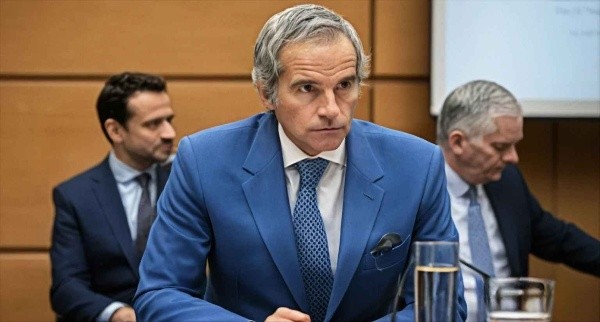Iran’s Plan to Strike Back Against the U.S.
Iran’s Military Preparations Following U.S. Attacks
Loading...

Director General of the International Atomic Energy Agency (IAEA) Rafael Grossi says he hopes to establish a constructive dialogue soon with Iranian President Masoud Pezeshkian to yield “real results.”
Aiming for Productive Talks
Rafael Grossi, the Director General of the International Atomic Energy Agency (IAEA), expressed optimism about initiating a constructive dialogue with Iran's newly elected President, Masoud Pezeshkian. During a quarterly meeting of the IAEA Board of Governors in Vienna, Grossi highlighted his intention to meet with Pezeshkian in Tehran to rejuvenate cooperation between Iran and the IAEA. He stated, “I encourage Iran to facilitate such a meeting in the not-too-distant future so that we can establish a constructive dialogue that leads swiftly to real results”.
Grossi's outreach follows his correspondence with Pezeshkian after the latter's election in July. The Iranian president has indicated a willingness to meet at an appropriate time, which Grossi hopes will occur before the upcoming U.S. presidential election on November 5.
Recent Developments in Iran's Nuclear Program
The backdrop to these discussions is Iran's ongoing nuclear activities, which have intensified since the U.S. withdrawal from the 2015 Joint Comprehensive Plan of Action (JCPOA) under former President Donald Trump. Following this withdrawal, Iran began to reduce its commitments under the JCPOA, leading to increased uranium enrichment activities. Notably, Iran has enriched uranium to a purity level of 60% at its Fordow facility and has installed new IR2M and IR4 cascades at the Natanz facility, which are now prepared for uranium gas injection.
Despite these developments, Grossi noted that while there is ongoing work at these facilities, there is no indication of an urgent push for a significant increase in enrichment production. He emphasized the importance of dialogue to address these issues constructively.
Iran's Response to IAEA Resolutions
Iran's permanent representative to the United Nations in Vienna, Mohsen Naziri Asl, voiced concerns regarding the IAEA Board of Governors' recent resolution against Iran. He warned that such measures could undermine the positive atmosphere necessary for effective interaction between Tehran and the IAEA. Naziri Asl criticized the resolution as ineffective, stating, “This resolution can neither divert the international community’s attention from true intention of the troika (E3) to give the Israeli regime enough time to continue the genocide in Gaza with complete impunity, nor can it exert pressure on Iran to renounce its rights and its peaceful nuclear program”.
He further asserted that the E3—comprising Britain, France, and Germany—should be held accountable for the repercussions of the resolution, which he deemed unproductive. Naziri Asl expressed hope for future discussions that would be free from political bias, acknowledging the likelihood of anti-Iran statements from the EU and the E3 regarding Iran's nuclear activities.
Looking Ahead
As the IAEA and Iran prepare for potential talks, the focus remains on establishing a framework for cooperation that addresses both parties' concerns. Grossi's call for dialogue reflects a broader desire to stabilize relations and ensure that Iran's nuclear program remains peaceful and transparent. The upcoming discussions could play a crucial role in shaping the future of nuclear diplomacy in the region, especially in light of the geopolitical tensions surrounding Iran's nuclear ambitions and the international community's response to them.
In conclusion, the IAEA's efforts to engage with Iran signal a critical juncture in nuclear diplomacy, with hopes for constructive outcomes that could benefit both parties and contribute to regional stability.
Editor
Iran’s Military Preparations Following U.S. Attacks
Troops remain in five strategic locations, raising fears of renewed tensions and long-term occupation.
Opposition forces have taken control of the capital after a significant offensive. Here is how it unravelled.
